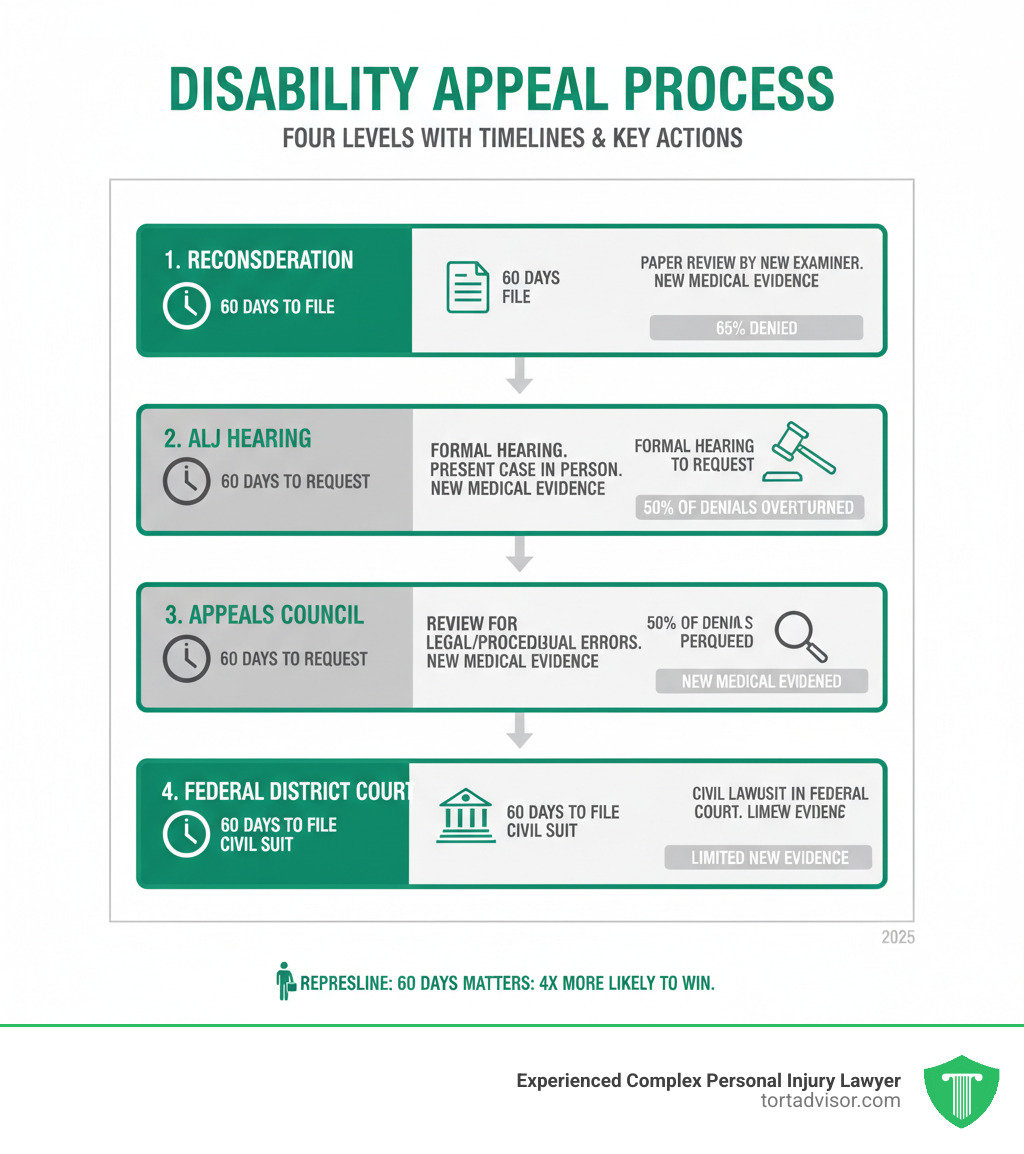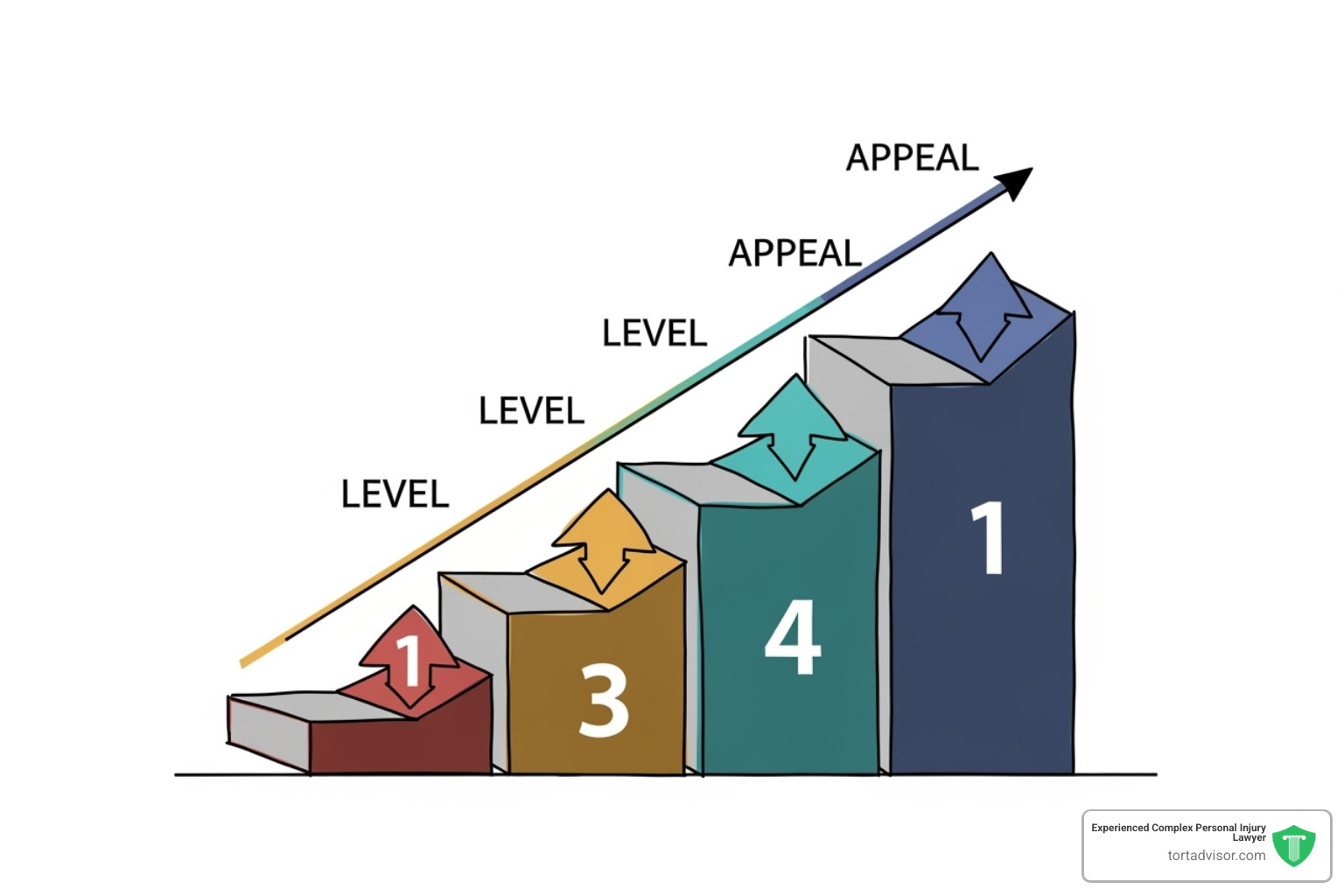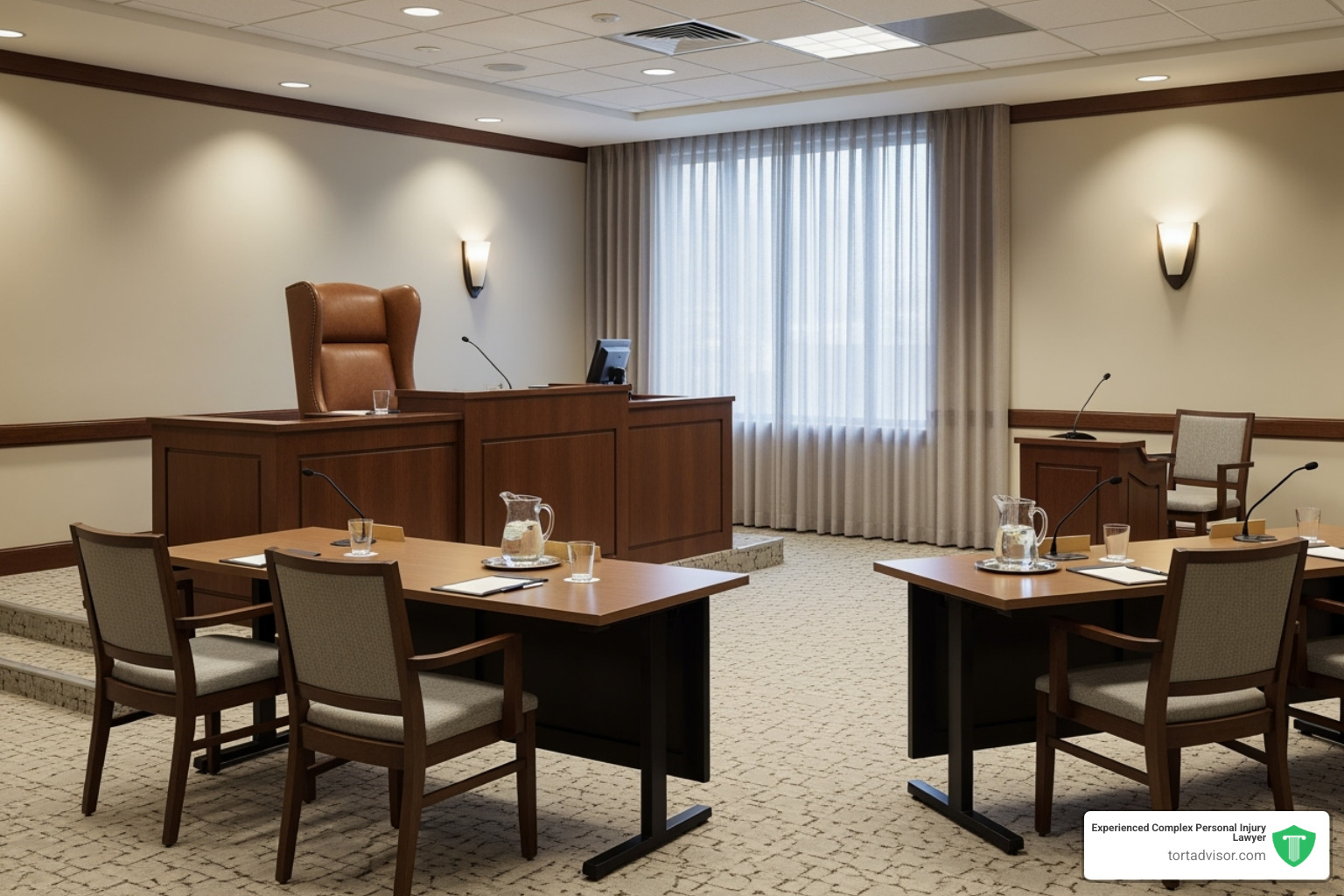


Why the Disability Appeal Process Is Your Second Chance at Justice
Getting a denial letter from the Social Security Administration (SSA) is devastating, but it’s not the end of your story. The SSA denies approximately 65% of initial disability claims, which is why the disability appeal process exists. It’s a structured, four-level system that gives you a second chance at justice.
The four levels of appeal are:
- Reconsideration: A paper review by a different examiner.
- Administrative Law Judge (ALJ) Hearing: A formal hearing where you present your case.
- Appeals Council Review: A review of the ALJ’s decision for legal errors.
- Federal District Court: Filing a civil lawsuit in federal court.
The SSA knows initial decisions can be wrong. In fact, administrative law judges overturn nearly half of the denials that reach them. Common reasons for denial, like insufficient medical evidence or failure to follow treatment, can often be fixed during an appeal.
Time is critical. You have just 60 days from the date on your denial letter to file your first appeal. Missing this deadline could mean starting over and losing months of back pay. Statistics also show that claimants with legal representation are significantly more likely to win their cases. This guide will walk you through each level of the appeal process so you can understand your rights and maximize your chances of success.
Disability appeal process further reading:
- Denied disability claim
- Disability claim assistance
- how to claim social security disability insurance arkansas
The Four Levels of the Social Security Disability Appeal Process
The disability appeal process offers four distinct chances to make your case. Each level has a strict 60-day deadline from when you receive a decision. Missing a deadline usually means starting over, so persistence and timeliness are key.
Level 1: Reconsideration
After a denial, you have 60 days to request reconsideration. This stage is a paper review conducted by a new examiner who has not seen your file before. They will review all original documents plus any new medical evidence you submit. This is a crucial time to add updated doctor’s opinions, new test results, or records showing your condition has worsened. You can file Form SSA-561 online. However, most claims are denied again at this stage, leading to the next, more promising level.
Level 2: The Administrative Law Judge (ALJ) Hearing
This is where your chances of success increase dramatically. An ALJ hearing is a de novo review, meaning the judge looks at your case fresh, without bias from prior denials. Unlike paper reviews, this is your opportunity to testify in person or by video before a judge. You can explain your daily struggles, and your attorney can present your case and question expert witnesses. The judge may call a vocational expert to testify about jobs you can or cannot do, or a medical expert to give an opinion on your condition. An attorney can cross-examine these experts to ensure their testimony is accurate. The ALJ then issues a decision, which can be ‘fully favorable’ (a full approval) or ‘partially favorable’ (approval with a different start date or for a limited time). Approval rates are highest at this stage, especially for those with legal representation.
Level 3: Appeals Council Review
If the ALJ denies your claim, you have 60 days to ask the Appeals Council to review the decision. This is not a new hearing. The Council reviews the ALJ’s decision for legal or procedural errors, such as misapplying SSA rules or ignoring important evidence. You can submit a written brief arguing why the ALJ’s decision was legally flawed. New evidence is only considered if it’s “new, material, and chronologically relevant” to the period on or before the ALJ’s decision. The Council can deny the review, remand (send) the case back to an ALJ for a new hearing, or, in rare cases, issue its own decision.
Level 4: Federal District Court Action
If the Appeals Council denies your review, your final option is to file a civil lawsuit in Federal District Court within 60 days. A federal judge will not hear new testimony but will review the entire administrative record to determine if the SSA’s final decision was supported by “substantial evidence” and followed the law correctly. You are arguing legal errors, not re-presenting your medical case. The judge can affirm the SSA’s denial, reverse the decision and award benefits (which is rare), or remand the case back to an ALJ for another hearing. This step requires significant legal expertise and is where an experienced attorney is essential.
Key Elements for a Successful Appeal
Think of your disability appeal process as building a case—and like any solid structure, it needs the right materials, proper timing, and a clear blueprint. A successful appeal often comes down to three critical elements: strong medical evidence, meeting strict deadlines, and understanding your specific program (SSDI or SSI).
Building a Strong Case: What Evidence Do You Need?
Medical evidence is the foundation of your appeal. Your claim needs more than just a diagnosis; it needs proof of your functional limitations.
- Medical Source Statements: Detailed reports from your treating doctors explaining your prognosis and, most importantly, how your condition limits your ability to perform work-related activities (sitting, lifting, concentrating, etc.).
- Residual Functional Capacity (RFC) Forms: These forms, completed by your doctor, provide a clear assessment of what you can still do despite your impairments.
- Objective Medical Evidence: Test results like MRIs, X-rays, blood work, and psychological evaluations provide concrete, measurable proof of your condition.
- Treatment History: A complete record of all doctor visits, therapies, medications, and hospitalizations shows you are actively managing your condition.
- Witness Testimony: Statements from friends or family can corroborate your testimony by describing how your disability affects your daily life.
SSDI vs. SSI: How the Disability Appeal Process Differs
While the four-level appeal structure is the same for both programs, the core requirements differ.
- Social Security Disability Insurance (SSDI) is based on your work history. Appeals focus almost entirely on proving your medical condition prevents you from working.
- Supplemental Security Income (SSI) is a needs-based program. In addition to proving medical disability, you must meet strict income and asset limits. An SSI appeal may require you to submit updated financial documents.
These differences also affect back pay calculations. For medical denials, the process of proving your disability is identical for both programs. For more information, the SSA provides guidance on Understanding the SSI appeals process.
Critical Timelines and How to Check Your Appeal Status
The most important rule is the strict 60-day deadline to file an appeal at any stage. The SSA allows a 5-day grace period for mail, but you should act immediately. Missing a deadline means you will likely have to start a new application and lose potential back pay. Proving you had “good cause” for a late filing is very difficult.
You can check your appeal status through your online ‘my Social Security’ account, by calling the SSA’s national number at 1-800-772-1213 (TTY 1-800-325-0778), or by visiting your local Social Security office. If you have a legal representative, they will handle communications and keep you updated.
The Power of Legal Representation in Your Appeal
The disability appeal process is a legal maze. Having a qualified disability attorney or representative can dramatically improve your outcome. Most work on a contingency fee basis, meaning they only get paid if you win. The fee is legally capped at 25% of your back pay, up to a maximum of $7,200 for most cases, so you don’t need money upfront. At Tort Advisor, we connect clients with top-rated specialty attorneys because we believe everyone deserves expert advocacy. For more information, visit Disability Claim Assistance.
When Should You Consider Hiring a Lawyer?
The earlier, the better. An ideal time is after your initial denial. An attorney can review the denial, spot weaknesses in your file, and help build a stronger case for reconsideration.
It becomes critical before an ALJ hearing. This is a formal legal proceeding. An attorney will prepare you for testimony, cross-examine the SSA’s expert witnesses, and submit legal arguments on your behalf. You should also consider a lawyer if you have complex medical conditions or are uncomfortable speaking in a formal setting. Finally, a lawyer ensures all strict deadlines are met, protecting you from losing your appeal rights on a technicality.
The Statistical Advantage of Having an Attorney
The numbers are clear: legal representation works.
- Claimants with a representative are four times more likely to win at the hearing level.
- 56% of claimants with representation are approved, compared to only 33% of those without.
Our experience at Tort Advisor reflects this trend. 69% of our customers are approved at the hearing level—significantly higher than the national average—because we connect them with highly skilled, specialized attorneys.
An experienced attorney excels at gathering the right medical evidence, preparing you for testimony, and challenging expert opinions. The SSA has legal experts on its side; you should too.
Frequently Asked Questions about the Disability Appeal Process
Here are answers to common questions about the disability appeal process.
What happens if my benefits were stopped and I need to appeal a medical cessation?
If the SSA determines you are no longer disabled after a Continuing Disability Review (CDR), they will move to stop your benefits. You have the right to appeal this decision.
- You have 60 days from the date of the notice to file an appeal (Form SSA-789).
- Crucially, you have only 10 days from receiving the notice to request “benefit continuation.” If you meet this 10-day deadline, your benefits can continue while your appeal is pending.
Missing the 10-day window means your payments will stop during the appeal. The appeal itself follows the same four-level process. Given the tight deadlines and complex rules outlined in the SSA’s guide on What to do if your benefits stop, seeking legal help immediately is highly recommended.
Can I submit new and relevant evidence at each stage of the appeal?
Yes, and you absolutely should. Continuously updating your file with new medical evidence strengthens your claim.
- Reconsideration: Submit any new test results, specialist reports, or doctor’s notes to fill gaps in your initial application.
- ALJ Hearing: This is a key opportunity to submit evidence showing how your condition has progressed over time. Submit it at least five business days before the hearing.
- Appeals Council: The rules are stricter here. New evidence is generally only considered if it is “new, material, and chronologically relevant” to the period on or before the date of the ALJ’s decision.
What is the difference between a Reconsideration and a hearing before an ALJ?
These first two appeal stages of the disability appeal process are very different.
- Reconsideration is a paper review. A new examiner reviews your file and any new documents you submit. There is no direct interaction, and the decision is based solely on the written record. Most claims are denied at this stage.
- An ALJ Hearing is an interactive hearing. You get to testify before a judge, either in person or by video. You can explain your limitations in your own words, and your attorney can present arguments and question witnesses. The judge makes a fresh decision. This stage offers the highest chance of approval.
Conclusion: Secure the Justice and Benefits You Deserve
The disability appeal process is complex, with four levels of review, strict 60-day deadlines, and demanding evidence requirements. But a denial is not the final word. The system is designed to give you multiple opportunities to prove your case.
Persistence is essential. Many successful claimants are denied at early stages but win their case at an ALJ hearing or beyond. The key is to not give up.
The statistics show that legal representation dramatically improves your chances of success. An experienced disability attorney acts as your guide, ensuring you build the strongest possible case, meet every deadline, and are prepared for your hearing. They know what it takes to win.
At Tort Advisor, our mission is to connect you with a top-rated specialty attorney who will fight for you. Your disability is your daily reality, and you deserve an expert advocate in your corner. Don’t steer this difficult process alone. Take the next step to secure the justice and benefits you deserve. Get help with your disability claim and let us connect you with an expert who can make a difference.
Free Confidential Case Evaluation
Complete the short form below to get an immediate FREE case review with an expert in your specific claim. Don't wait, your case could be time sensitive to file a claim.
Related Posts
Discover New Jersey disability benefits: TDI, FLI, SSDI, SSI rates, eligibility, applications & appeals for 2025-2026.
Hire a Depo-Provera lawsuit attorney now. Fight Pfizer for meningioma risks from injections. Free consult, MDL updates & settlements up to $1.5M.
Find top Miami florida car accident lawyers after your 305 crash. Get max compensation, navigate no-fault laws & choose the best experts now!
Diagnosed with cancer after Roundup? Learn about the monsanto roundup lawsuits, eligibility criteria, and how to pursue your claim.
Discover how do you qualify for a hair relaxer lawsuit: criteria, diagnoses, evidence & brands in uterine cancer MDL. Claim review now!
Find the best uber sexual assault lawsuit lawyer: expert guides, MDL experience, proven results & nationwide firms for justice.










